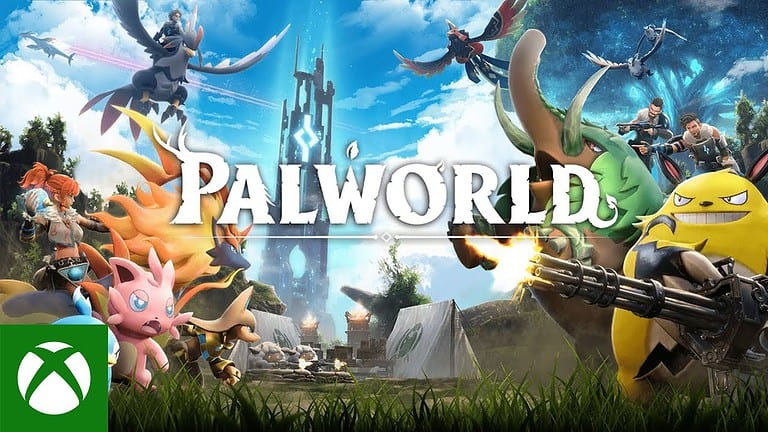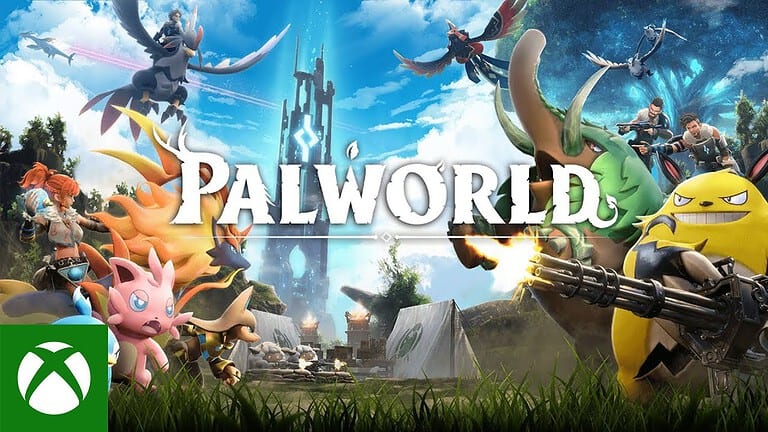
Nintendo is currently in a legal battle with Pocketpair over the game Palworld, but despite this, the recent PS5 launch has been performing very well in Japan. So well that it is topping the PS5 sales charts there – even outselling major titles like Dragon Ball: Sparking Zero (which is very important to Nintendo).
The outcome of the lawsuit will play out in the courts and is still unknown, but it has sparked important conversations about intellectual property rights in the gaming industry. Pocketpair is committed to defending Palworld against Nintendo’s claims, highlighting ongoing debates about innovation and competition in gaming. Analysts and fans are closely watching this case as it could set important precedents for future development and legal issues in the industry. While Nintendo aims to protect its intellectual property, Pocketpair’s challenge may lead to a reevaluation of what is considered acceptable in game design. The future of both companies is uncertain as they navigate this challenging situation in gaming history.
Whatever the case, there’s no doubt people want to play the game and its popularity is surging.
Palworld’s Rocky Launch
Palworld took the gaming world by storm when it first launched in early 2024. Despite facing controversy and legal challenges, the game has achieved remarkable success, particularly in Japan where it surprisingly topped the PS5 charts. This success comes amidst a lawsuit from Nintendo, who allege that Palworld infringes on their intellectual property rights, most likely due to similarities with the Pokémon franchise. The lawsuit and the attention it has brought raise questions about the boundaries of inspiration and imitation in the gaming industry. It also highlights the challenges developers face when navigating the legal complexities of game creation, especially when venturing into popular genres dominated by established giants like Nintendo.
A Controversial Success
Palworld’s popularity stems from its unique blend of familiar monster-catching gameplay with mature themes and open-world exploration. Players can befriend and battle Pals, explore diverse environments, and engage in crafting and building activities. However, the game also includes elements like hunting, resource exploitation, and even the use of Pals as weapons in a factory setting. This darker twist has sparked debate among players and critics, with some praising its originality while others express concerns about its ethical implications.
Navigating Legal Challenges
The lawsuit filed by Nintendo casts a shadow over Palworld’s future. Nintendo is known for vigorously protecting its intellectual property, particularly the Pokémon franchise. While the specific claims of the lawsuit remain undisclosed, it likely revolves around gameplay mechanics that Nintendo believes are too similar to their own. The outcome of this legal battle could have significant implications for Palworld’s development and availability, as well as for other developers who draw inspiration from existing games.
The Impact on the Gaming Industry
The Palworld situation raises important questions about the balance between innovation and imitation in game development. While drawing inspiration from successful titles is common practice, there’s a fine line between homage and infringement. The lawsuit’s outcome could set a precedent for how courts interpret intellectual property rights in the gaming world, potentially influencing how developers approach creating games within established genres.
Looking Ahead
Despite the legal uncertainties, Palworld’s initial success demonstrates a demand for games that offer fresh takes on familiar formulas. Whether the game can maintain its momentum and overcome the legal hurdles remains to be seen. However, the controversy surrounding it has undoubtedly sparked conversations about creativity, originality, and the legal complexities of game development in a competitive market.
The Rise of Indie Games
The gaming landscape is evolving, with indie games carving out a significant space alongside big-budget titles. Indie developers often bring unique ideas and innovative gameplay mechanics to the table, offering players experiences that differ from mainstream offerings. Games like Stardew Valley, Hollow Knight, and Undertale have achieved massive success, proving that creativity and originality can resonate with a large audience. The rise of indie games has also fostered a more diverse and inclusive gaming community, with developers from various backgrounds bringing their perspectives and stories to the forefront. This trend is likely to continue as indie developers push the boundaries of game design and offer players fresh and exciting experiences.
Short Summary:
- Nintendo and The Pokémon Company have filed a lawsuit against Pocketpair, claiming infringement on specific patents.
- Pocketpair contends that the lawsuit is unfounded and insists on defending its position in court.
- Despite legal challenges, Palworld maintains a strong presence in the gaming market and has expanded to PlayStation 5.
Nintendo’s recent lawsuit against the developers of Palworld, Pocketpair, has generated significant buzz in the gaming community. The lawsuit alleges patent infringement concerning mechanics that are fundamental to gameplay, positioning the legal battle as a critical moment for both the companies involved and the gaming industry at large.
In mid-September 2024, Nintendo and The Pokémon Company officially lodged their lawsuit against Pocketpair in a Japanese court, focusing on specific patents that they claim Palworld has infringed upon. These patents were originally registered in Japan, specifically identified as Patent No. 7545191, Patent No. 7493117, and Patent No. 7528390. The accusations suggest that Palworld improperly utilizes technologies centered around creature capture and game mechanics, which Nintendo argues are exclusive to their gaming patents.
“Nintendo has launched this lawsuit not simply as a legal formality but as a significant defensive move to protect its intellectual property in a competitive landscape,” says industry analyst Serkan Toto.
According to Pocketpair, the monetary demands from Nintendo and The Pokémon Company amount to ¥10 million, roughly equivalent to $65,000. This figure seems relatively modest when viewed against the substantial revenue Palworld has generated since its launch earlier this year. The developer has publicly stated its intention to combat the lawsuit vigorously, indicating that they will “continue to assert our position in this case through future legal proceedings.”
Analysts Weigh In
Opinions from patent analysts regarding this lawsuit are notably critical. Florian Mueller, a seasoned analyst in this arena, has referred to the lawsuit as “a clear case of bullying.” His analysis of the patents cited by Nintendo reveals that they may lack the novelty required for enforceability.
“None of the patents Nintendo claims Palworld has infringed describe any kind of technological innovation; they cover systems for capturing creatures and riding on them, mechanics that already exist in other games,” Mueller pointed out.
Mueller further elaborated on the nature of these patents, arguing that they merely combine “token references” to standard hardware and software components with game mechanics—which are generally not patentable. He indicates that Nintendo’s strategy might be a tactical maneuver to leverage incidental elements of Palworld’s gameplay mechanics.
The discussion around this lawsuit paints a broader picture for the gaming industry. Since many elements of gameplay can be considered generic or unpatentable, criticizing Nintendo’s approach is common among analysts. A key assertion from Mueller indicates that if Nintendo’s legal actions succeed, it could have “disastrous ramifications for the entire gaming industry,” potentially stifling innovation.
Patents Under Scrutiny
The patents in question range in their application from capturing mechanisms (Patent No. 7545191) to character interactions, movement, and pathfinding mechanics (Patents No. 7493117 and 7528390). Understanding these patents’ intricacies is crucial, as Pocketpair argues they are not unique to Nintendo.
This situation takes on a complex layer when considering the timeline of Palworld’s development. The game was initially announced in mid-2021, before the key patents were filed later that year. While Pocketpair has not shied away from asserting their position, the challenge of proving that Palworld constitutes ‘prior art’ complicates their legal standing. Mueller explains:
“There must be more than just an announcement; a comprehensive description of how the gameplay feature is implemented is necessary for it to count as prior art.”
Impact on Market Performance
Despite the ongoing litigation, Palworld has continued to thrive in the marketplace. The title has recently made its debut on the PlayStation 5, which has provided it with a robust platform for expansion and visibility. Even in the face of the lawsuit, Pocketpair’s determination to innovate and develop the Palworld franchise remains steadfast.
The company has also formed a partnership with Sony to create Palworld Entertainment, which aims to cultivate the franchise further and explore additional merchandise opportunities. This collaborative venture exemplifies Pocketpair’s proactive approach amid legal turbulence and its pledge to continue enhancing player experiences.
Community Reactions
Community response to the lawsuit has been decidedly mixed, with many gamers voicing support for Pocketpair. Criticism of Nintendo’s approach has surfaced widely in online forums, with players emphasizing how competition in the gaming landscape could enhance product quality across the board.
“Nintendo needs to lose this lawsuit so that more creators can emerge with new ideas and competitors, effectively shaking up a stagnant market,” commented one user on a gaming forum.
Another sentiment echoed in the community was the desire for Nintendo to recognize the beneficial impacts of healthy competition within the industry. Many gamers have expressed their intrigue for Palworld, promoting the game as a much-needed alternative to the established Pokémon franchise.


